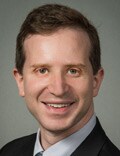PHILADELPHIA — Intravenous eculizumab (Soliris, Alexion Pharmaceuticals) significantly decreased risk for relapse in patients with neuromyelitis optical spectrum disorder (NMOSD) over placebo, in a new multicountry phase 3 study.
Findings from PREVENT, a randomized controlled trial of 143 adults with aquaporin-4 antibody–positive (AQP4-IgG) NMOSD, showed that 3% of the participants who received eculizumab vs 43% of those who received placebo had adjudicated relapses. The active-drug group also had a significantly lower adjudicated annualized relapse rate.
In February, the US Food and Drug Administration (FDA) granted priority review for eculizumab for treating NMOSD and set a Prescription Drug User Fee Act (PDUFA) action date of June 28. There are currently no drugs approved specifically for this indication.

Dr Dean Wingerchuk
"This is the first published randomized controlled trial that clearly demonstrates benefit of a drug for this condition. Up until now, we've really only had observational studies," co-principal investigator Dean M. Wingerchuk, MD, professor and chair of the Department of Neurology at the Mayo Clinic in Phoenix and Scottsdale, Arizona, told Medscape Medical News.
"I think the results of the trial are quite compelling, as far as the efficacy of eculizumab. So I'm hopeful that the FDA will look at this novel evidence favorably and suspect that there's a good chance that the drug could get approved," he said.
The findings were released ahead of their presentation at an Emerging Science (ES) session at the upcoming American Academy of Neurology (AAN) 2019 Annual Meeting and were simultaneously published online May 3 in the New England Journal of Medicine.
Largely Targets Women
NMOSD, which is also often referred to as NMO, is an inflammatory, complement-mediated disorder of the central nervous system characterized by relapses of accumulating disability, including blindness, paralysis, and sometimes death. It typically affects the spinal cord and optic nerves.
AQP4 is "a water channel protein expressed mainly by astrocytes in the central nervous system. Antibodies of the IgG class against AQP4 are present in 65 to 88% of patients with NMODS," the investigators note.
Eculizumab is a humanized monoclonal antibody and a C5 complement inhibitor. The FDA approved it for treating paroxysmal nocturnal hemoglobinuria in 2007, for atypical hemolytic uremic syndrome in 2011, and for generalized myasthenia gravis in 2017.
As reported at the time by Medscape Medical News, an open-label pilot study presented at the 2012 American Neurological Association Annual Meeting showed promising results for the drug as a treatment for NMOSD.
In addition to the upcoming FDA action date, filing for this indication is under review in the European Union and filing in Japan is planned for later this year, Alexion noted in a February press release. The company added that the disease "primarily affects women, often in the prime of their lives."
For the current study, 143 adult patients (91% women; mean age at receipt of trial drug, 44.3 years) with AQP-4-IgG–positive NMOSD were enrolled from April 2014 through October 2017 at sites in 18 countries. All participants were randomly assigned in a 2:1 ratio to receive one weekly injectable dose of eculizumab 900 mg for 4 weeks followed by a 1200-mg dose every 2 weeks (n = 96) or matching placebo (n = 47).
Patients were allowed to continue also taking stable-dose immunosuppressive therapy — except for rituximab. In fact, use of that particular drug within the previous 3 months was a study exclusion.
Treatment was planned to go until relapse (when patients then moved into open-label therapy), trial discontinuation by a patient, or event-based end of trial.
"The trial was designed to continue until 24 patients had a relapse of NMOSD, as adjudicated by an independent panel," the researchers write.
"After a review of blinded data, representatives of the sponsor terminated the trial after 23 patients had had an adjudicated relapse, given the uncertainty in estimating when the final event would occur," they add.
Provides Hope?
The primary outcome was first adjudicated relapse, which occurred in 3 of the participants who received eculizumab (3%) and in 20 of those who received placebo (43%). This resulted in a hazard ratio (HR) of 0.06 (95% confidence interval, 0.02 - 0.20; P < .001). Median time until first adjudicated relapse was 103 weeks in the placebo group but was not reached in the eculizumab group.
First physician-determined/nonadjudicated relapse also occurred in fewer members of the eculizumab group (15%) than in the placebo group (62%; HR, 0.18; P < .001).
The secondary measure of adjusted adjudicated annualized relapse rates were 0.02 vs 0.35 in the two groups, respectively (P < .001).
Mean score change on the Expanded Disability Status Scale (EDSS) was not significantly different between the eculizumab and placebo groups (–0.18 vs 0.12, respectively).
Trial discontinuation occurred in 17% of the eculizumab group vs 6% of the placebo group. However, only two patients (both in the placebo group) discontinued because of adverse events (AEs).
AEs that were more common in the eculizumab group than in the placebo group were upper respiratory tract infections (31 vs 19 per 100 patient-years) and headaches (55 vs 38 per 100 patient-years). The rate of serious AEs was 17 vs 55 per 100 years, respectively, "with the exclusion of relapses," the researchers report.
One patient in the active- treatment group died of pulmonary empyema; this patient was also taking azathioprine. Associated cultures showed Streptococcus intermedius and Peptostreptococcus micros.
Meningococcal infection did not occur in any trial participant, and there were 8 vs 15 cases per 100 patient-years of other serious infections in the eculizumab vs placebo groups.
"By blocking the terminal complement system, eculizumab increases the risk of meningococcal and encapsulated bacterial infection," the investigators write. That's why all trial participants received vaccination for this condition at baseline.
"The microorganisms that were implicated in our trial patient who died…are not associated with complement deficiency," the researchers note.
Overall, the study drug was linked to a lower risk for relapse than placebo in this patient population; however, because there wasn't a significant difference between the groups on disability progression, "the long-term effect of eculizumab in patients with NMOSD warrants further study," write the investigators.
Still, "the study goes a long way to confirm the original hypothesis that complement is in fact an important mechanism in the disease. So that should lead to further investigations and better targeted treatments in the future," Wingerchuk said.
"I think this provides significant hope to patients that there will be not only this medication but also other medications in the near term and longer term for treating this disease."
Relapse Prevention "Paramount"
Commenting for Medscape Medical News, Asaff Harel, MD, a neurologist specializing in neuroimmunology at the Northwell Multiple Sclerosis (MS) Center at Lenox Hill Hospital, New York City, said that the study was well-designed and "had a decent number" of participants.

Dr Asaff Harel
"It was also a time-to-event study, which is good because that's what's hindered the FDA approval of other medications for NMO," he said. "You can't really do that many placebo-controlled studies in NMO. So I think they did a really good job getting past that issue. And they showed that eculizumab is beneficial for relapse reduction compared to placebo."
Harel, who was not involved with the research, noted that he wasn't surprised there were no between-group differences in disability progression on the EDSS.
"That's one of those difficult things to show in a lot of studies," he said. "I think it may just be a matter of time or perhaps relapse severity, but I don't think it's odd. If you took a study out to 2 years, you might see that there's a difference on disability."
Asked whether he thinks the FDA will approve the drug for this indication, Harel said yes — especially because it's already been approved for similar neurologic conditions.
"From the standpoint of the FDA, we have no treatments for NMO right now. So I think that they're going to approve it. Whether they approve it outright or decide to take their time and delay, I'm not sure; but ultimately I think it will be approved," he said.
Harel, who has treated patients with NMOSD, added that it's a potentially devastating condition "with recurrent episodes of inflammation of the spinal cord or of the optic nerves. And that can leave people with a substantial accrual of disability, even after just one relapse sometimes, and with poor recovery."
"So prevention of relapses is paramount. I think having a medication that is approved by the FDA for NMO would be powerful." He noted that approval would mean fewer problems with insurance payments and fewer delays in treatment, which, in turn, could lead to fewer relapses.
"It's going to be an interesting year for NMO because there are a couple of other treatments" that are also in the pipeline, Harel said. "I think we're going to see more and more options, which will lead to better control of the condition over all."
The study was funded by Alexion Pharmaceuticals. Wingerchuk reports having received grants from Alexion during the conduct of the study and personal fees from MedImmune, Celgene, Novartis, ONO Pharmaceuticals , BrainStorm Therapeutics, Caladrius, and Biogen outside the submitted work. Disclosures for the other study authors are fully listed in the original article. Harel has disclosed no relevant financial relationships.
American Academy of Neurology (AAN) 2019 Annual Meeting. Abstract ES.009. To be presented May 7, 2019.
N Engl J Med. Published online May 3, 2019. Abstract
Follow Deborah Brauser on Twitter: @MedscapeDeb
For more Medscape Neurology news, join us on Facebook and Twitter
Medscape Medical News © 2019 WebMD, LLC
Send comments and news tips to news@medscape.net.
Cite this: PREVENT: Eculizumab May Lower Relapse Risk in NMOSD - Medscape - May 04, 2019.

Comments